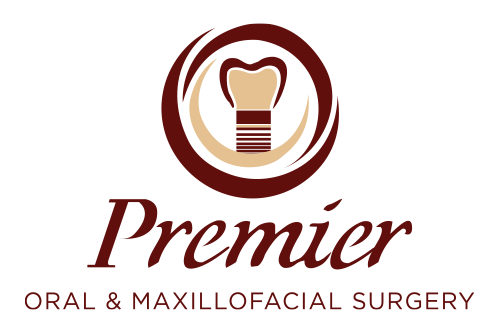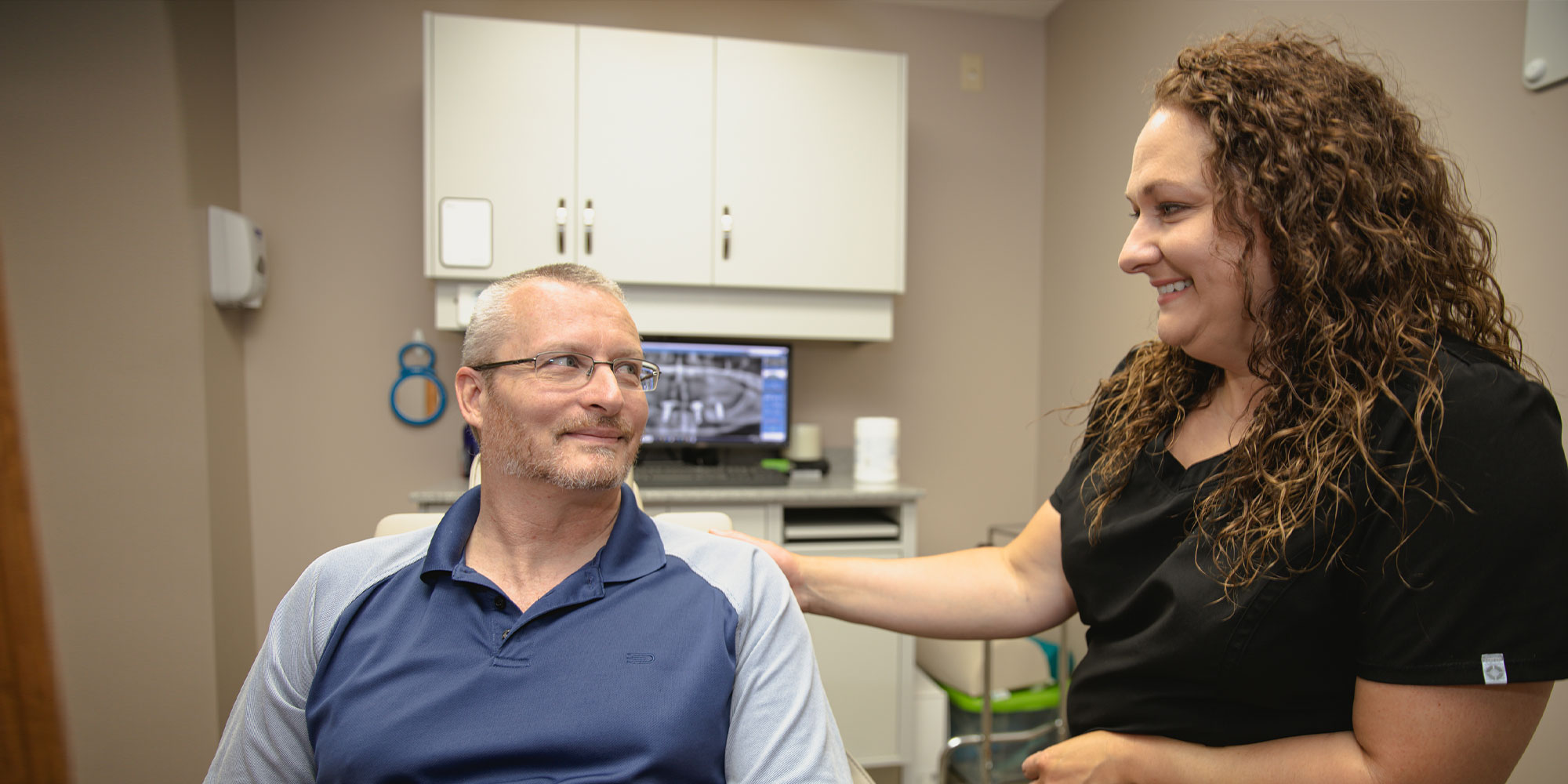Experience the Benefits of Wise Wisdom Tooth Extraction
Wisdom teeth are thought to date back to distant ancestors, who needed additional (third) molars to eat coarser diets than modern humans. As we evolved and changed our eating habits, these teeth became obsolete and our jaws became smaller. Thus, the average modern mouth is only large enough to accommodate 28 teeth. When wisdom teeth develop between the ages of 17 and 25, they typically don’t align or erupt properly. They may grow sideways, partially erupt or remain trapped beneath the gum and bone. According to the American Association of Oral and Maxillofacial Surgeons (AAOMS), a high percentage of people have at least one impacted wisdom tooth when their third molars come in. Due to the position at the back of the mouth, impacted wisdom teeth are often prone to infection and cavities. Because this area is difficult to clean, bacteria can build up and lead to gum disease. In rare cases, a fluid-filled cyst may develop and weaken the jaw bone. As a board-certified oral and maxillofacial surgeon, Dr. Afolabi Ogunleye has advanced training and skills to manage complex tooth extractions, as well as the accreditation to administer all forms of anesthesia. Thanks to Dr. Ogunleye’s vast expertise, Premier Oral & Maxillofacial Surgery is a trusted practice for wisdom teeth extraction in Papillon, NE.
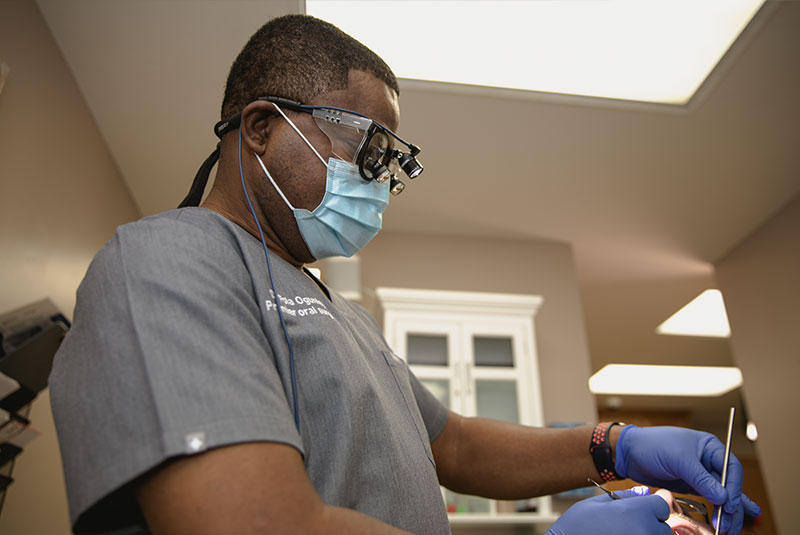
Reasons to See an Oral Surgeon for Wisdom Tooth Extraction
In addition to extensive experience in third molar extraction, oral and maxillofacial surgeons are thoroughly trained to safely and comfortably administer all forms of anesthesia. Dr. Ogunleye offers IV and oral sedation, as well as nitrous oxide (commonly known as “laughing gas”) and general anesthesia. Wisdom teeth removal in Papillon, NE – be it simple or complex – is one of the most frequent procedures performed at our practice. If you or your teen is experiencing pain, swelling or swollen gums around the third molars, we encourage you to schedule an evaluation with our board-certified oral surgeon in Papillon, NE. Even when third molars appear to be erupting correctly and there is no evidence of cavities or disease, AAOMS recommends active and regular monitoring by an oral surgeon to assure they remain problem-free. Studies show early evaluation and treatment results in superior outcomes for patients. Wisdom tooth extraction is covered by insurance and we accept third-party financing, should you incur any out-of-pocket costs, so there’s no reason to delay treatment.
Signs of Problematic Wisdom Teeth
- Swollen or red gums around back molars
- Persistent tooth and jaw pain
- Bad breath or unpleasant taste in the mouth
- Blood or pus near molars
- Swollen jaw or cheeks
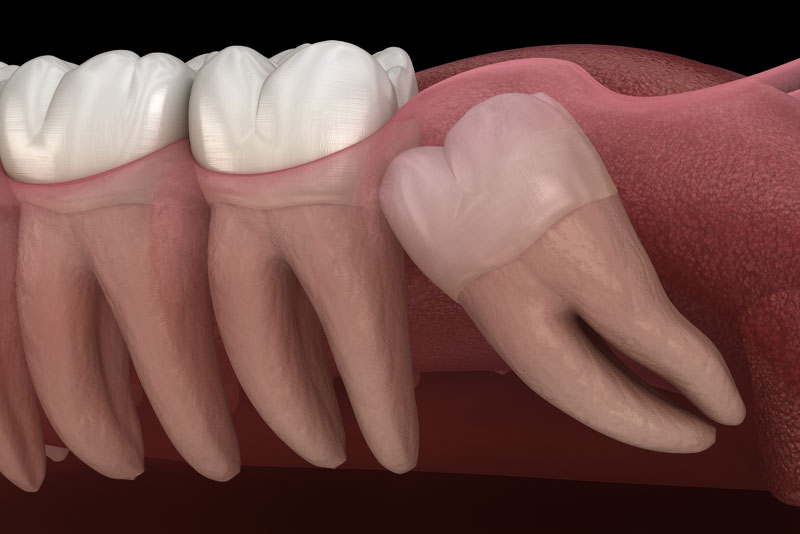
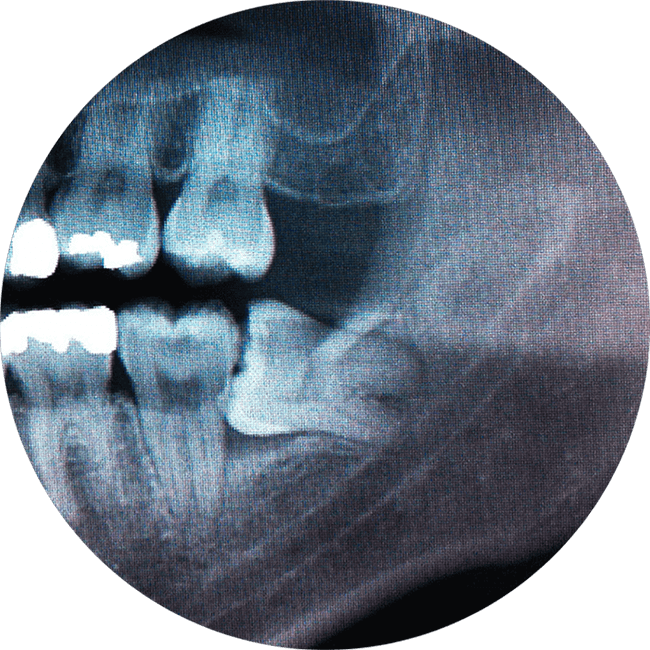
Our Wisdom Tooth Extraction Process
Based on your oral examination and digital X-rays, Dr. Ogunleye will evaluate the position of your wisdom teeth and determine the presence of immediate or future problems. Prior to surgery, our team will thoroughly discuss anesthesia options with you, as well as rare but potential surgical risks, such as sensory nerve damage or sinus complications. After the wisdom teeth are removed, your gum tissue is sutured and we’ll ask you to bite down on gauze placed in your mouth to control bleeding. You’ll rest under supervision in our office until your sedation has worn off, and then you’ll be ready to go home! If you had IV sedation, oral sedation or general anesthesia, you’ll need a designated driver to take you home. Upon discharge, we’ll give you a postoperative kit with specific instructions that we’ll review before you leave. While many patients only need over-the-counter (OTC) medication to control swelling or discomfort during recovery, we will give you a prescription for pain medication and we’ll also provide a prescription for antibiotics to prevent infection. Before you leave the office, we’ll also schedule a follow-up appointment for approximately one week after surgery for suture removal.
Postoperative Care
Unnecessary pain, swelling and potential complications such as infection can be minimized when you carefully follow our postoperative instructions.
Immediate Post-Surgery
Immediately following surgery, the gauze pad should be kept in place for 30 minutes. After this time, you can carefully remove and discard it. You need to avoid vigorous mouth rinsing or touching the wound area to prevent dislodging the formed blood clot. We suggest taking prescribed or OTC pain medication before you begin to feel discomfort. When you get home, place ice packs on the side of your face where the tooth was extracted to reduce the risk of swelling. You should restrict activities on the day of surgery and resume them when you feel able and comfortable enough to do so.
Bleeding
Slight redness in your saliva, oozing or bleeding is fairly common after wisdom tooth extraction. If you experience excessive bleeding, first rinse or wipe old clots from your mouth, then place a gauze pad over the area, bite down firmly for 30 minutes and repeat if necessary. If bleeding continues, bite on a moistened tea bag for 30 minutes. Tannic acid in the tea bag contracts bleeding vessels, which helps new clots to form. To minimize further bleeding, sit upright and avoid exercise or any other strenuous activities. If bleeding doesn’t subside, call our office for further instructions.
Swelling
Swelling around the mouth, cheeks, eyes and sides of the face is your body’s normal reaction to surgery and recovery. Typically, you won’t experience swelling until the day after surgery, and it will typically peak two to three days after surgery. As mentioned, immediate use of ice packs can minimize swelling. While you’re awake, apply the ice packs for 20 minutes, leave them off for 20 and repeat this process. After 36 hours, ice has no beneficial effect on swelling, therefore you should discontinue its use. After this timeframe, application of moist heat to the sides of your face can further reduce any swelling.
Pain
For moderate pain, take one or two tablets of acetaminophen (e.g., Tylenol or Extra Strength Tylenol) every three to four hours, or 200 mg of ibuprofen (e.g., Motrin or Advil) every four to six hours. For severe pain, take the tablets we prescribe to you, as directed. Prescription pain medication can cause grogginess and slowed reflexes, so don’t drive an automobile, work around machinery or drink alcoholic beverages. Don’t suddenly sit up or stand from a lying position, as this can cause dizziness.
Pain or discomfort following surgery should subside gradually every day. If it doesn’t, this could be a sign of “dry socket,” a painful condition that is more common with extraction of impacted wisdom teeth. If postoperative pain in and around the extraction site increases in severity one to three days after extraction, this may be caused by partial or total disintegration of the blood clot from the tooth socket. If you experience this symptom, call our office right away!
Diet
The day of surgery, don’t use a straw, as this can cause more bleeding by dislodging the blood clot. Drink a minimum of five to six glasses of liquid daily (except iced tea) to avoid dehydration. The first few days after surgery, we recommend eating only soft and highly nutritious food (e.g., protein shakes). Try to maintain a healthy diet and don’t skip meals to ensure you’re receiving nutrients required for proper healing.
Oral Hygiene
As mentioned, you shouldn’t rinse with anything until the day following surgery, but you can brush your teeth the night that you’re home from surgery, provided you rinse gently. The day after surgery, rinse your mouth a minimum of five to six times a day (especially after eating) with a cup of warm water mixed with a teaspoon of salt.
Don’t suffer from pain caused by impacted wisdom teeth!
Schedule worry-free, expert wisdom tooth extraction today.
